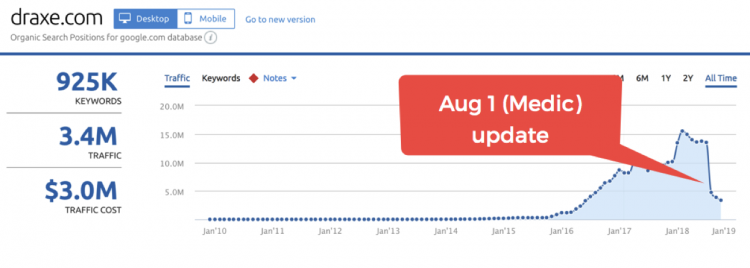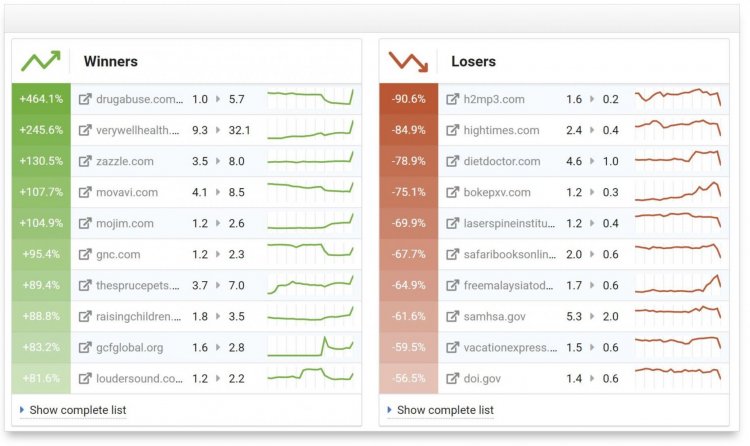
A recent update to Google’s algorithm sent many highly-respected (or so we thought) website rankings down the drain.
Dr. Axe was one of the update’s victims, claiming a massive portion of his organic traffic.

Many other online businesses have experienced the same drop – or an equally drastic increase in traffic.

Why the change?
What is causing some well-fed SEO rankings to slide down the title tags? And what is causing some previously poor-ranked websites to find their place among the high-traffic drivers?
The answer lies in a single word and, at the same time, an entire manuscript of complexity.
That word is trust.
Google Algorithm Update: What has changed?
Since the days of yore, Google has worked to build an algorithm that ranks websites based on how much online consumers trust those websites. This is why small, seemingly insignificant factors, such as bounce rate, time-on-page, backlinks, and social signals have played a long-time impact on the rankings of websites in Google.
All of those algorithm clauses are an effort on the part of Google to create a search-space for the people, by the people – one where only the helpful, the authentic, and the trustworthy survive.
These last changes (made on September 27th and thought to be modifications to Google’s August 1st Medic Update) have only increased the fervor with which Google is empowering trustworthy websites over untrustworthy ones.
In fact, remember our friend Dr. Axe?
Before his massive drop in traffic, this warning was sitting on his website…

According to Marie Haynes – a search engine consulting company – many other websites that experienced a significant drop in organic traffic after September 27th had similar warnings.
Okay – so Google’s cares more about how trustworthy your website and your business are than it ever has before…
But that leaves a lot of questions…
What is trust in Google’s eyes?
How do you build a “trustworthy” online business?
What might you be doing that would deem your website untrustworthy?
Here’s what we know…
The truth is, we don’t know much. From Google’s base, not much has been said. But the online world is running rampant with correlations and conjecture.
We know that Google cares a lot about how much other websites and visitors to your website trust you. But, more importantly, we know that the below elements are likely contributors to whether Google trusts you or not…
Actions that Build Trust with Google
- Responding to comments/reviews/conversations about your website and/or business with patience and dignity – Google seems to be giving more merit to online companies that people are talking bout with a positive tone. And they also seem to like when you – the business – engage with those comments, whether positive or negative, in a dignified and gentle manner.
- Being a true authority in your niche – The more that people quote you, talk about you, and mention you in their own online writing – whether comments, articles, or video transcripts, the more that Google will view you as an authority in your industry, ranking you better.
- Having easy-to-access contact info – Contact info that’s easy to access on your website tells Google that you’re not afraid of your customers contact you and that you’re ready to help them if they do. Don’t hide your contact information or Google might rank you lower.
- Having SSL on your website – SSL increases the security of your website and, thus, how much Google trusts you with its cherished users. Fortunately, all Carrot have free access to SSL on their websites.
- White hat backlinks to your website – Backlinks are great for your website, but only if you build them the right way. We show you how to grow your backlinks.
Actions that hurt trust with Google
- Ignoring negative comments or reviews about your business on other websites – Whenever possible, respond to these comments with graciousness rather than ignoring them.
- Too many negative reviews – The more negative reviews you have, the more trust-issues Google will have with your website. Avoid bad reviews by answering customer questions as soon as they come in.
- Hiding contact info – This makes Google think you’re trying to hide something and you don’t want your customers getting in contact with you. Put your contact information front-and-center and easy to find.
- PBNs or other black hat links – While shady link-building strategies might benefit your website rankings in the short term, Google almost always finds out and penalizes the offender. You can learn more about the dangers of black-hat SEO.
- Deceiving visitors
- Too many grammatical errors – A few don’t hurt, but too many can hurt trust all around.
The point?
Okay – so not a whole lot has changed.
Google cares about how much online consumers trust your website. But they’ve always cared about that. Now, they just care a bit more, in a different way. Google cares about how much (and how positively or negatively) people are talking about your business online. They also seem to care about how you engage with those comments.
All of these changes (and more will likely come in the future) are Google’s attempt at gauging how trustworthy – and worthy of being ranked – your website is.
The ultimate lesson is, do whatever will increase trust with your website visitors and don’t try to deceive Google.
We’ll keep you updated as more Google algorithm iterations roll out – his us with questions in the comments if you have any!